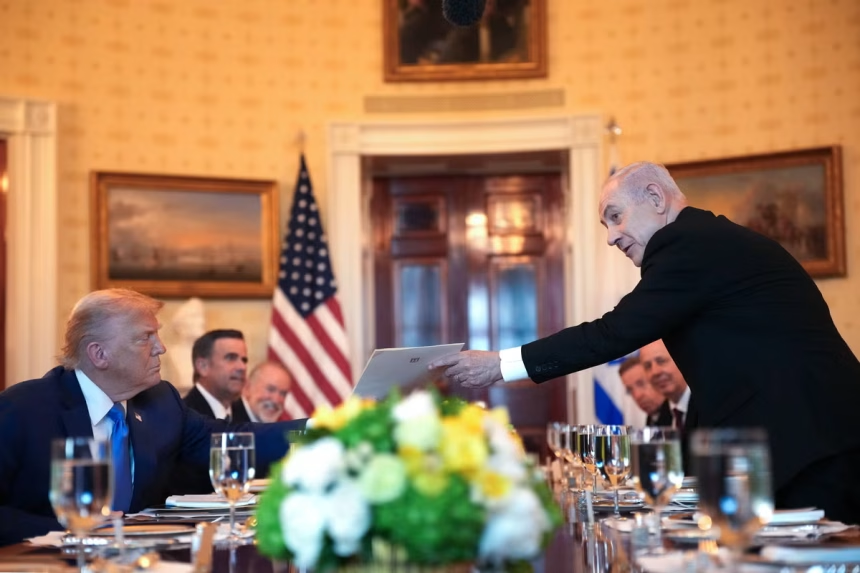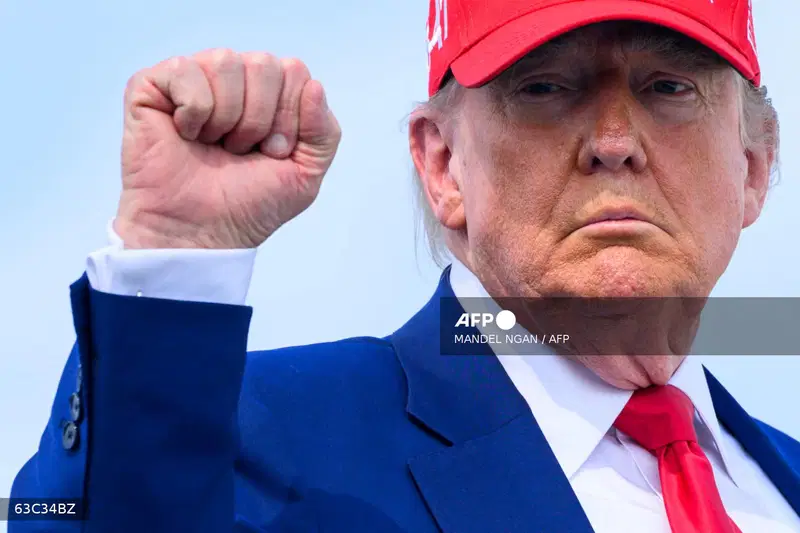Headline
‘You Should Get It’, Netanyahu Nominates Trump For Nobel Peace Prize

Netanyahu gives Trump letter for Nobel Peace Prize
Israeli Prime Minister, Benjamin Netanyahu, on Monday, said that he had sent a letter to the Nobel Prize Committee to nominate US President, Donald Trump for the Nobel Peace Prize.
Trump and Netanyahu met at the White House on Monday to discuss developments in the Middle East.
“He’s forging peace, as we speak, in one country, in one region after the other.
“So, I want to present to you, Mr. President, the letter I sent to the Nobel Prize Committee; it’s nominating you for the Peace Prize, which is well deserved, and you should get it,” Netanyahu said as he reached over the table to present Trump with his document.
“Thank you very much. This I didn’t know. Wow. Coming from you, in particular, this is very meaningful. Thank you very much, Bibi,” Trump responded.
READ ALSO ‘Netanyahu Must Go’, Israel’s Ex-PM Calls Leadership ‘Catastrophic’
Trump was expected to press Netanyahu to agree to a ceasefire in Israel’s 21-month-old war against Hamas in Gaza amid an outcry over the humanitarian cost of an offensive that has led to nearly 60,000 deaths, most of them Palestinian.
Israeli and Hamas negotiators met for indirect talks for the first time in six weeks in Qatar on Monday. While both sides have spoken positively about the prospects for a ceasefire, several crucial negotiating points remain, including guarantees from the Israeli side that the war would not continue and Netanyahu’s insistence that Hamas be banished from Gaza for good.
Before dinner in the Blue Room at the White House, Trump was asked whether he believed that Palestinians should be forcibly removed from Gaza, amid reports that Israel has laid out plans to force all Palestinians in Gaza into a camp on the ruins of Rafah, a plan that has been criticised as a blueprint for ethnic cleansing. Trump directed Netanyahu to answer the question.
READ ALSO: Netanyahu Vows To Thwart ‘Any Attempt’ By Iran To Rebuild Nuclear Programme
“It’s called free choice. You know, if people want to stay, they can stay, but if they want to leave, they should be able to leave.
“It shouldn’t be a prison. It should be an open place and give people a free choice. We’re working with the United States very closely about finding countries that will seek to realize what they always say they wanted – to give the Palestinians a better future. And … I think we’re getting close to finding several countries,” said Netanyahu, who is wanted by the international criminal court for alleged war crimes relating to the Gaza war.
At the beginning of the meeting, Netanyahu presented Trump with a letter that he said he had sent to a committee for the Nobel Peace Prize, commending Trump’s efforts to end conflicts in the Middle East.
It was the second high-profile nomination for the president: last month Pakistan said it would recommend Trump for the Nobel Peace Prize.
During the meeting, Trump also said that he “hoped” that the US would not strike Iran again.
Trump said, “They want to work something out. They’re very different now than they were two weeks ago.”
He declined to give a date for upcoming talks with Iran but told reporters they would find out more details tomorrow.
Sources in the prime minister’s entourage described the talks in Qatar as positive, according to Israel’s military radio station and an Israeli official quoted by Reuters. Palestinian officials were more downbeat and said initial meetings on Sunday had ended inconclusively.
Netanyahu had met with Middle East envoy Steve Witkoff and secretary of state Marco Rubio earlier on Monday. He is expected to remain in Washington to meet with Vice President JD Vance and senior officials, including House Speaker Mike Johnson.
Headline
U.S. Lawmaker Reacts To Nigeria, U.S. Airstrikes

United States Congressman, Riley Moore, has stated that President Donald Trump is determined to put an end to the killing of Christians in Nigeria, warning that further action may follow if the violence persists.
Moore made the statement on Friday via his official X handle.
According to the lawmaker, the strike represents the first step in addressing what he described as the ongoing slaughter of Christians and the broader security crisis affecting Nigerians across religious and ethnic lines.
READ ALSO:US Dept Of War Shares Video Of Air Strikes In Nigeria
“President Trump has been clear that the killing of Christians in Nigeria must end,” he said.
He that the administration’s resolve on the matter should not be underestimated.
“As I stated at the outset: Do not test President Trump‘s resolved in this matter.
READ ALSO:JUST IN: US Forces Bomb Terrorists Camps In Nigeria
“Tonight’s strike in coordination with the Nigerian government is just the first step to ending the slaughter of Christians and the security crisis affecting all Nigerians,” he said.
He stressed that the operation signals a stronger stance by the United States in support of Nigeria’s efforts to tackle terrorism and violent extremism, noting that further measures could be taken if the situation does not improve.
Headline
US Dept Of War Shares Video Of Air Strikes In Nigeria

A video footage of the US military air strikes in Nigeria has emerged.
The video was released by the US Department of War following its air strikes against terrorists in Sokoto.
Earlier, the US secretary of War, Pete Hegseth had confirmed that military air strikes hit terrorists in Nigerians, saying it was deadly.
Later on, the US. African Command, confirmed that it conducted the attacks described as very deadly by President Donald Trump.
Trump said he was only keeping the promise he made earlier last month to strike the terrorists he believes are killing innocent Christians.
READ ALSO:JUST IN: US Forces Bomb Terrorists Camps In Nigeria
Although described as powerful and deadly, the casualty caused by the attack is yet to be released.
Explaining further, security expert, Brant Philip, said the strikes may have been launched “from the USS Paul Ignatius, using a Tomahawk missile.”
The Nigerian government through its ministry of foreign affairs has also confirmed that the strikes were successful.
Watch video here
Headline
JUST IN: US Forces Bomb Terrorists Camps In Nigeria

United States President Donald Trump said US forces conducted deadly strikes against Islamic State terrorists in northwestern Nigeria, and vowed more attacks if the militants keep killing Christians.
“I have previously warned these Terrorists that if they did not stop the slaughtering of Christians, there would be hell to pay, and tonight, there was,” Trump posted on his Truth Social platform, adding that “the Department of War executed numerous perfect strikes.”
READ ALSO:JUST IN: Kano Lawmaker, Sarki Aliyu Daneji, Dies Hours After Colleague’s Passing
Trump stated that the Department of War “executed numerous perfect strikes, as only the United States is capable of doing. Under my leadership, our Country will not allow Radical Islamic Terrorism to prosper.”
The US president wished everyone Merry Christmas, “including the dead Terrorists, of which there will be many more if their slaughter of Christians continues.”
Details later.

 News4 days ago
News4 days agoPHOTOS: New Era In Furupagha-Ebijaw As Okpururu 1 Receives Staff Of Office

 News3 days ago
News3 days agoUBTH CMD Marks 120 Days In Office, Expresses Commitment To Providing Conducive Working Environment

 News4 days ago
News4 days agoOPINION: Gumi And His Terrorists

 News3 days ago
News3 days agoFIRS Confirms NIN As Tax ID

 News4 days ago
News4 days agoFG Declares Public Holidays For Christmas, New Year Celebrations

 Metro3 days ago
Metro3 days agoFintiri Pardons Man Sentenced To Death For ‘Killing Herdsman In Self-defence’, Others

 News4 days ago
News4 days agoOPINION: Christmas And A Motherless Child

 News3 days ago
News3 days agoOPINION: My Man Of The Season

 News2 days ago
News2 days agoJUST IN: Kano Lawmaker, Sarki Aliyu Daneji, Dies Hours After Colleague’s Passing

 News3 days ago
News3 days agoKWAM 1 Withdraws From Awujale Race, Ends Court Challenge


























